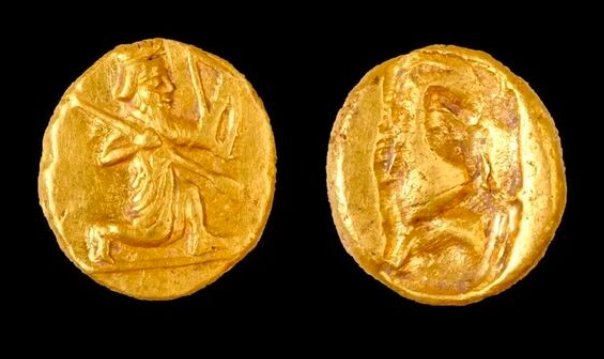In a stunning archaeological discovery, researchers have uncovered a pot filled with ancient Persian gold coins in the ancient Greek city of Notion, located in modern-day Turkey. This remarkable find, dating back to the fifth century B.C.E., includes dozens of gold coins known as darics, each featuring the image of a kneeling archer. The discovery, made by a team from the University of Michigan, sheds new light on the historical interactions between Greek and Persian civilizations and offers a glimpse into the economic and military history of the region.
The Discovery of the Persian Gold
Archaeologists from the University of Michigan, in collaboration with Sinop University and the Turkish Ministry of Culture and Tourism, made the groundbreaking discovery while excavating a residential home in Notion. The pot of gold coins was found buried beneath the courtyard of a house dating back to the third century B.C.E. The coins, however, are much older, dating to the fifth century B.C.E., and are believed to have been buried during a time of significant political and military upheaval.
The coins, known as darics, were a type of gold currency issued by the Persian Empire. Each coin features the figure of a kneeling archer, a design element that underscores their Iranian origins. The discovery of such a valuable hoard in a controlled archaeological excavation is extremely rare, and it provides valuable insights into the economic practices and military history of the region.

The context of the coins’ burial suggests they were hidden during a period of conflict, possibly to protect them from being looted. The presence of these coins in Notion indicates the city’s strategic importance and its role as a contested frontier between Greek and Persian forces.
Historical Context and Significance
The discovery of the Persian gold coins in Notion is significant for several reasons. Firstly, it highlights the city’s historical importance as a strategic location frequently contested by Greek and Persian forces. Notion, situated in western Turkey, was a key site during the fifth century B.C.E., a period marked by intense military conflicts between the Greek city-states and the Persian Empire.
The coins themselves, known as darics, were likely minted in Sardis, the capital of the Persian satrapy of Lydia. These coins were used to pay mercenary soldiers, and their presence in Notion suggests that the city was a hub for military activity. The discovery of the coins provides tangible evidence of the economic and military interactions between the Greek and Persian civilizations.
Furthermore, the discovery sheds light on the broader historical context of the region. During the fifth century B.C.E., Notion was occupied by Persian sympathizers and mercenaries. The city was later reclaimed by Athenian forces, leading to significant political and military upheaval. The burial of the coins during this period suggests they were hidden to protect them from being seized during the conflicts.
Implications for Future Research
The discovery of the Persian gold coins in Notion has far-reaching implications for future archaeological research. It underscores the importance of continued exploration and study of ancient sites to uncover hidden treasures and gain a deeper understanding of historical events. The find also highlights the potential for discovering more artifacts that can provide valuable insights into the economic and military history of the region.
Researchers are now focusing on analyzing the coins and their context to gain a better understanding of their significance. By studying the materials and construction techniques used in the coins, archaeologists hope to learn more about the technological advancements of the time. This research will contribute to a broader understanding of the economic and military practices of ancient civilizations.
The excavation at Notion serves as a reminder of the rich cultural heritage of Turkey and the importance of preserving and protecting archaeological sites. As more discoveries are made, the historical significance of Notion will continue to grow, offering new insights into the interactions between Greek and Persian civilizations and the economic and military history of the region.













